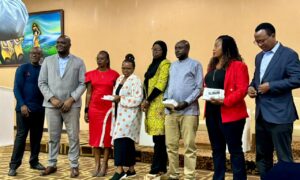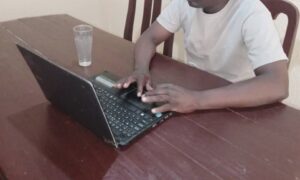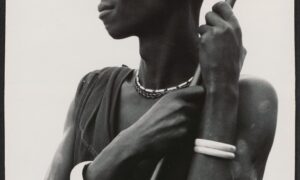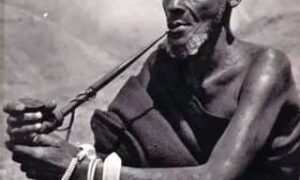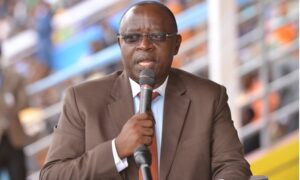H.E. António Guterres, Secretary-General United Nations
New York, NY
CC/:
26 April 2021
- E. Félix Tshisekedi, President of the DRC & Chairperson of the African Union;
- E. Bintou Keita, SR and Head of MONUSCO;
- E. Yoweri Museveni, President of the Republic of Uganda;
- E. Paul Kagame, President of the Republic of Rwanda;
- E. Évariste Ndayishimiye, President of the Republic of Burundi;
- E. Uhuru Kenyetta, President of the Republic of Kenya and Chairperson of the Summit of Heads of State;
- E. Moussa Faki Mahamat, Chairperson of the AU Commission;
- E. Joseph Biden, President of the United States of America;
- E. Charles Michel, President of the EU Council;
- E. Madame Ursula Von Der Leyen, President, EU Commission ;
- E. President Nyusi, President of Mozambique and Chairperson of SADC;
- E. João Lourenço, President of the Republic of Angola and Chairperson of the ICGLR;
- E. Michelle Bachelet, UN High Commissioner for Human Rights;
- E. Alice Wairimu Nderitu, Special Adviser of the Secretary- General on the Prevention of Genocide;
- Ms Fatou Bensouda, ICC Prosecutor;
Re: Ethnic Cleansing of the Banyamulenge Community in the Hauts-Plateaux of South Kivu Province in the DRC
Dear Secretary-General,
Faced with inaction to our previous warnings, through letters dated 27 April 2020 and 29 June 2020, on the siege of the Banyamulenge community by a coalition of Mai Mai militias and foreign armed groups with the complicity of elements of the Congolese military, we are writing this letter, with deep sense of sorry and desperation, to ring an ultimate alarm bell on the unfolding ethnic cleansing in final stages targeting our community in the entire hauts plateaux of South Kivu.Letter.UN SG.26.04.2021 (1) (1) Letter.UN SG.26.04.2021 (1) (2) Letter.UN SG.26.04.2021 (1) (3) Letter.UN SG.26.04.2021 (1)
After four years of concerted attacks by a coalition of Mai Mai militias and foreign armed groups targeting the Banyamulenge Community in the Bijombo, Mikenke, Minembwe and surrounding areas, the northern territory of the moyens and hauts plateaux stretching from Katobwe and Kahololo to Rurambo was recently the new theatre of attacks that appear to be succeeding in cleansing the area of any Banyamulenge presence. As of the writing of this letter, the area has been nearly totally cleansed of any Banyamulenge presence. Members of this community have either been killed, forced to flee or are still hiding in the bushes, tracked by the assailants. This latest wave of attacks has created a humanitarian disaster whereby those fleeing the attacks, women, men, children, old and young, are forced to walk more than 50 km in inhospitable environments with no assistance and a constant fear of extermination. Many are stranded between Lemera and Bwegera with no assistance and limited security guarantees.
The Katobwe-Kahololo-Rurambo area had largely remained peaceful and largely spared from systematic attacks. This relative peace was a result of a constant dialogue between local Bafuliiru, Banyamulenge and Banyindu communities who had vowed to preserve peace and good relations that had characterised their interactions for generations. However, due to a rising wave of hate speech and an increased firepower of the attacking Mai Mai and Red-Tabara forces from Burundi, that fragile peace was broken since mid-March 2021. The systematic and coordinated nature of the recent attacks clearly show that the openly professed goal of cleansing the hauts plateaux of any Banyamulenge presence and kicking members of this community out of the borders of the DRC is largely being achieved.
On 16 March, Mai Mai Ilunga and Red-Tabara launched attacks in the Kahololo area, killing 4 people, including an 82-year-old woman, burning 3 villages (Kageregeri, Kahundwe, Rwinkubo). Attacks intensified in the beginning of this month of April when the attackers burned the villages of Mataba and Goshen on 9 April 2021. Several other villages including Marungu 1 and 2, Murambi, Gitembe, Rukuka, Gahusi and Bijige (Bibangwa) were attacked and burned the following day. On 21 April 2021, four other villages namely Nyakamungu, Kageregeri 2, Mugono and Birindiro were attacked and burned. Finally, on 23 April, 16 villages that had served as a refuge for the fleeing and distressed Banyamulenge population were destroyed in a single day pushing survivors on the slopes of the hauts plateaux towards the Ruzizi plain where most of them are currently stationed in inhospitable conditions, fatigued, hungry and in constant fear of being exterminated. The latest attacks have claimed several dozens of lives and the whereabouts of many members of the community are still uncertain since those who could not flee have either been killed or are trapped in their hiding bushes, with retreating chances of survival, in an environment where they are surrounded by their attackers. The survivors who have fled the entire area have lost all their possessions, including herds of cattle and small livestock which were looted by the attacking Mai Mai and Red-Tabara groups.
While recent attacks were aimed at destroying the Katobwe-Kahololo-Rurambo area that had largely remained safe, the ethnic cleansing nature of the unfolding tragedy is evidenced by the fact that attacks have not stopped in the Bijombo-Mikenke-Minembwe area. Since the beginning of April, attacks have increased in the latter area in circumstances that clearly show a high degree of complicity between the Congolese army deployed in the area (as denounced in our previous communications) and Mai Mai militias. For instance, on 1 April, Mai Mai attacks were launched on the villages of Kabingo, Masha, Monyi, Rutigita and others in the Minembwe area. Instead of securing the attacked population, the Congolese army attacked the besieged villagers, killing 5 people, including teachers and students. Similarly, on 9 April, three young people were killed in the Bibokoboko area by soldiers of the Congolese army in circumstances that have not been clarified, absent any official investigation in the matter.
Mr. Secretary General,
The above-described recent dynamics clearly show that, the inaction that followed our previous warnings has emboldened those who have vowed to cleanse the hauts plateaux and the entire DRC.
of any Banyamulenge presence. We are conscious of the fact that the inaction is often justified by a misguided reading of what is happening on the ground. Similarly to the Rwandan context some 27 years ago, a dominant reading of what is happening in the hauts plateaux often captures the events in terms of inter-ethnic conflicts. Instead of empathizing with the Banyamulenge civilians under sustained attacks from several local armed groups recruiting from ethnic communities (Bembe, Fuliiru, Vira and Nyindu) acting in close collaboration with Red-Tabara, with documented complicities of elements of the Congolese military and public officials, several reports on the conflicts, informed by disinformation campaigns, often blame the victims. Even UN investigations on the ground have often displayed partial or misguided readings of the realities due to involved actors’ limited engagement with the Banyamulenge community. In a characteristic tendency to portray the events under ethnic lenses and “balance” the blame, reports have failed to give due attention to the plight of a small Banyamulenge community assailed from all sides, both at the local and national levels.
The fact that a largely outnumbered Banyamulenge minority community is undergoing this ordeal in this month of April when the world remembers the genocide that targeted the Tutsi of Rwanda with sad episodes of international failures in places like Bisesero but also in other contexts such as Srebrenica ̶ is quite ironic and displays the international community’s inability to learn from past mistakes. While the hauts plateaux area is difficult to access, the world cannot, again, hide behind a lack of knowledge or information on this avoidable tragedy. In addition to our past warnings on the foreseeability of what is currently happening absent decisive action to prevent the tragedy, MONUSCO has a sizable presence in the broad area and, dynamics leading up to the current situation, including sustained anti-Banyamulenge hate speech have been documented by the United Nations Joint Human Rights Office (UNJHRO). MONUSCO’s units on the grounds have been passive spectators of the unfolding tragedy. The force has occasionally engaged in what is described by survivors as photo opportunity stunts, such as the visit to Kahololo and Kitembe on 23 April 2021 when attacks resulting in the destruction of some 16 villages (described above) were taking place less than 10 km from the MONUSCO position.
Moreover, to our knowledge, neither the Congolese state, nor the international community have taken steps to sanction state actors and prominent public officials fuelling violence in the area. In our previous communications, we denounced the complicity of individual DRC officers deployed in the hauts plateaux area in the attacks that target the Banyamulenge but nothing has been done to remedy the situation. The intensification of attacks on the Banyamulenge in recent days is a product of an increased support that civilian officials and elements of the military on the ground lend to the attackers, under current circumstances where such support is not sanctioned. Even more paradoxically, some individuals involved behind the scenes in fuelling the flames of hate and violence have been rewarded for their actions. For instance, Justin Bitakwira, a public figure and former minister from the Bafuliiru community is on record calling the attacking Mai Mai militia (several from his community) his “boys” who will be rewarded if and when he is in public office. Similarly, incendiary declarations by high profile individuals such as Martin Fayulu who stated that there was no such a thing as the Banyamulenge in the DRC and that the Minembwe area was under foreign occupation, with his supporters vowing to liberate it, he is still regularly welcomed by members of the international community who contribute to the legitimation of his platform. Just as some members of the international community insisted on the participation of the extremist CDR party in the unity government in Rwanda in the1993-1994 period in Rwanda, lack of denunciation of extremist ethnic politics is one of the conducive factors for the unfolding tragedy.
The final stages of ethnic cleansing of the Banyamulenge in the hauts plateaux are taking place at a time when DRC president holds the rotating presidency of the African Union. It is not surprising therefore that continental bodies have remained silent on the plight of the Banyamulenge. Despite numerous “never again” pledges, regional authorities have failed to take decisive action, to prevent another tragedy of genocidal proportions from materializing. The Banyamulenge seem to have been sacrificed at the altar of geopolitical agenda. In view of the recent waves of attacks, Congolese authorities’ approaches to addressing the crisis in the hauts plateaux ̶ through intra and inter- community dialogues combined with military interventions ̶ have largely been unsuccessful.
In spite of past failings, we remain hopeful that it is not too late to act decisively to alleviate the suffering of the Banyamulenge community in the DRC and, reiterate our previous requests for the United Nations to:
- Take urgent and decisive action to stop the killings, the looting and, the ongoing, largely successful campaign of ethnic cleansing of the Banyamulenge in the DRC;
- Provide urgently needed humanitarian assistance and protection, through MONUSCO and other UN agencies, to displaced populations scattered across the hauts plateaux and the Ruzizi plain. Assistance and protection should build on past tragic experiences such as the Gatumba Massacre in August 2004, by guaranteeing effective protection to displaced population and shielding it from further attacks;
- Decisively engage the Congolese authorities in pursuing accountability for individuals bearing responsibility for atrocities committed against civilians, including members of domestic and foreign armed groups as well as elements of the Congolese armed forces;
- Promote peacebuilding and security strategies that are likely to provide equal protection for all, foster peaceful responses to conflicts, incentivize disarmament of combatants from various groups and re-build confidence between communities;
- Engage regional countries, in ensuring that non-domestic factors of tensions in the hauts plateaux, including the presence of foreign armed groups, are properly addressed once and for all.
We renew our hope, Mr Secretary General, that the United Nations, under your leadership and its presence on the ground, will play a more proactive role in protecting a displaced Banyamulenge population in distress and ensuring a return to stability and peaceful coexistence between communities in South Kivu and the rest of the DRC.
Yours sincerely
Ms. Adele Kibasumba Mr. Charles Mukiza
Banyamulenge Community in the USA Banyamulenge Community in the DRC
President (Mahoro Peace Association) President (Mutualité Kinshasa)
Félix Rubogora
President of Gakondo Coordinating Committee











